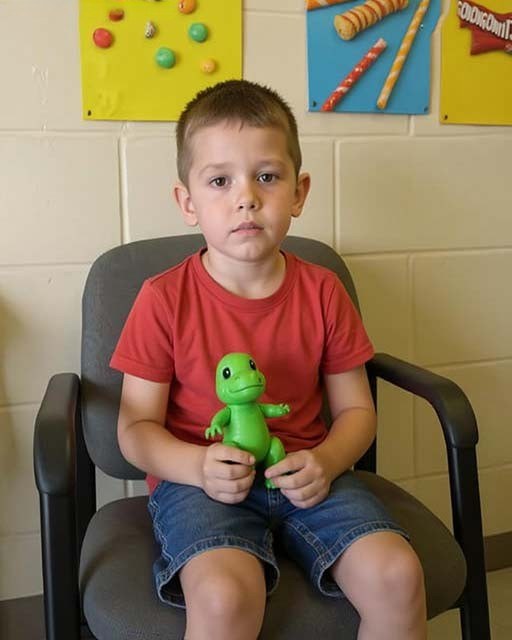I still remember the day Emma arrived. I was five when Mom and Dad told me I was going to be a big sister—they promised a lifelong friend, but they never warned me about becoming invisible. Before Emma, I was the apple of their eye: surprise cupcakes after school, bedtime stories, cozy snuggles. The moment Emma stepped through the door, all that vanished. Her cries summoned instant attention, her needs trumped everything else, and my own scraped knees or school play performances were forgotten.
Years passed. By the time Emma was walking and talking, I was old enough to pour my own cereal and pack my backpack. Asking for help earned me the “needy” label, while Emma’s tiniest whimper summoned both parents rushing to her side. Birthdays, school recitals, scraped knees—my panicked calls were eclipsed by Emma’s louder dramas.
Fast-forward two decades: I was thirty, raising my bright, curious three-year-old son, Theo, alone. His father walked away before he was born, and I’d struggled to piece together a life for the two of us, leaning on friends and the occasional paycheck from Mom and Dad. They weren’t unkind—just selectively generous. From the moment Emma’s son, Cody, was born, they practically adopted him as their third child, buying clothes, arranging lessons, and swooping in whenever Emma needed support. I, on the other hand, remained background scenery, useful only for staged family photos.
Last month, everything changed. I collapsed at work, clutching my side in agony, and ended up in the ER with a ruptured ovarian cyst. After emergency surgery, I lay in a hospital bed, painkillers humming through my veins, and thought first of Theo. Who would care for him? Clutching the phone, I dialed my parents.
“Mom, it’s urgent. I need someone to watch Theo while I recover,” I rasped.
Her sigh carried miles of indifference. “Sweetheart, we’re on babysitting duty for Cody all this week—Emma’s out of town.”
“Mom, I’m in the hospital. I can’t even lift my head.”
“I know,” she said, voice tight. “But we can’t handle two boys right now. I’m sorry.”
I hung up, fury and heartbreak colliding in my chest. While my own mother refused, my friend Maya—alone with two kids and a full-time job—dropped everything to take Theo. She showed up at the hospital, cradling him in her arms, and stayed by my side until I was well enough to call home.
When I finally left the hospital, weak and stitched up, I went straight to Maya’s. Theo erupted into tears of joy when he saw me, clinging to my leg and whispering, “Mom, I missed you like the moon.” My tears fell too—not from pain but from gratitude that someone truly saw us.
A week later, I summoned the courage to visit my parents. Emma was there, chatting with Mom about Cody’s daycare, Cody sprawled on the floor glued to a tablet, and Dad refilling coffee for Emma as if she were royalty. I stood silent until they noticed me.
“Oh, you’re out already!” Mom cooed. “Feeling better?”
“Tired,” I replied. “But I’m okay.”
Emma hardly looked up. “Kids are resilient,” she smirked. “Bet Theo was fine.”
“He was—thanks to Maya,” I said, watching their faces tighten.
Mom shifted. “We wish we could’ve helped, but Cody needed us.”
“Cody’s needs always come first,” I said, voice low but steady. “When I was in the hospital, I needed you.”
Emma rolled her eyes. “Don’t be dramatic.”
I shook my head. “No. I needed support, not excuses. You chose to help Emma instead of me.”
Dad cleared his throat. “We didn’t mean it like that.”
“But that’s exactly how it felt,” I said. “I’ve been invisible my entire life, except when you wanted a photo op.”
Silence swallowed the room. I left without another word, pain and clarity heavy in my heart.
Days later, a “Get Well Soon” card arrived: a generic Hallmark message and a scribbled “We’re sorry—hope you feel better soon. Love, Mom and Dad.” No mention of Theo, no real apology—just an attempt to smooth over a wound they’d helped inflict.
That night, as I tucked Theo into bed, I made him a promise: he would never feel invisible, never feel like a burden. The very next day, I stopped waiting for my parents to change and built a new support network. Maya and a circle of moms from preschool became our village—swapping child care, hosting picnics, lending shoulders to cry on during parenting’s chaos.
One afternoon at the park, Theo tripped and scraped his knee. He burst into tears, more from fright than pain. I scooped him up, kissed his brow, and whispered, “I’m here, baby. You’re safe.” He sniffled, gazed up, and said, “You always come, Mama.”
That was all I needed. I didn’t need my parents’ approval or pity. I had Theo and friends who showed up. Together, we laughed, we healed, and we built a life where I was no longer invisible.
And one day, I will tell Theo about the neglect and disappointment—but not to make him bitter. I’ll share it so he knows that love is something you give, not something you fight for, and that even in the face of hurt, you can create something better. Because we did. Together.
